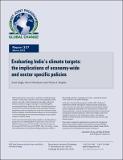Evaluating India’s climate targets: the implications of economy-wide and sector specific policies
Author(s)
Singh, Arun; Winchester, Niven Stewart; Karplus, Valerie Jean
DownloadMITJPSPGC_Rpt327.pdf (1.730Mb)
Metadata
Show full item recordAbstract
We employ a numerical economy-wide model of India with energy sector detail to simulate the impact of India’s commitments to the Paris Climate Agreement. We simulate targets for reducing CO2 emissions intensity of GDP via an economy-wide CO2 price and for increasing non-fossil electricity capacity via a Renewable Portfolio Standard. We find that compared to the no policy scenario in 2030, the average cost per unit of emissions reduced is lowest under a CO2 pricing regime. Adding an RPS increases the cost by more than ten times. Projected electricity demand in 2030 decreases by 8% under the CO2 price, while introducing an RPS further suppresses electricity demand. Importantly, a reduction in the costs of wind and solar power induced by favorable policies may result in cost convergence across instruments, paving the way for more aggressive decarbonisation policies in the future.
Date issued
2018-03Publisher
MIT Joint Program on the Science and Policy of Global Change
Citation
Report 327
Series/Report no.
MIT Joint Program Report Series;327